(Fighting New Coronary Pneumonia) The Prime Minister of Canada vaccinates the new crown vaccination and officially relaxes the applicable population of AstraZeneca
China News Agency, Toronto, April 23 (Reporter Yu Ruidong) Canadian Prime Minister Justin Trudeau received his first dose of the new crown vaccine in Ottawa on April 23.
On April 20th, Ontario, where Ottawa is located, will open appointments for residents aged 40 and over to receive Astra Zeneca vaccination at various pharmacies.
On the 23rd, 49-year-old Trudeau and 46-year-old wife Sophie were vaccinated at a local pharmacy.
Major television media in Canada conducted a live broadcast of this process.
Trudeau gave the camera his thumbs up after the injection.
Data map: Canadian Prime Minister Justin Trudeau and his wife Sophie China News Agency reporter Yu Ruidong
At the beginning of March last year, Sophie developed new crown-related symptoms after returning from the UK to Canada.
Canadian officials confirmed that she was diagnosed with the infection in the middle of the month.
She quarantined herself with Trudeau and close family members.
At the end of the month, she announced that she had recovered.
Many cabinet members of the Liberal government led by Trudeau, including the Minister of Health, have been vaccinated with AstraZeneca in recent days.
Some senior officials and experts in the media urged the public not to pick a vaccine, "The one you get is the best."
As the new crown vaccine produced by AstraZeneca has recently been accused of the risk of causing blood clots, the National Advisory Committee on Immunization of Canada recommended in early March not to vaccinate AstraZeneca for people 65 years and older.
By the end of March, the committee recommended an immediate suspension of the vaccine in people under 55 years of age.
The Canadian Public Health Agency also announced the suspension of the vaccine for people under 55 years of age.
Since mid-April, Canada has successively reported 4 cases of blood clots after vaccination.
However, the Canadian National Immunization Advisory Committee updated its vaccine-related recommendations on April 23, advocating that the scope of application of the AstraZeneca vaccine should be extended to people over 30 years of age.
The Canadian Ministry of Health believes that the probability of the AstraZeneca vaccine causing related adverse reactions is about 1 in 100,000 to 1 in 250,000, "the benefits outweigh the potential risks."
The Canadian Public Health Agency stated that its overall goal has always been to get as many people as possible to receive safe and effective vaccines as soon as possible to form immunity.
However, each province has the right to determine its own specific vaccination policies.
Canada has so far pre-purchased more than 400 million doses of the new crown vaccine from many pharmaceutical companies around the world.
In addition to the AstraZeneca vaccine, the country has also approved three vaccines from Pfizer, Modena, and Johnson & Johnson, but they continue to suffer from low supply efficiency.
Due to insufficient supply, some participants currently have to wait 16 weeks for the second dose of vaccine.
Canada suffered a severe rebound from the epidemic this spring, and the medical systems in many places were embarrassed and had to introduce blockade measures one after another.
The new epidemiological model data released by the Public Health Agency of Canada on the 23rd showed that the bans in "severely affected areas" such as Ontario, British Columbia, and Quebec are working, and the epidemic curve has slowed down.
However, the situation in Manitoba, Alberta and other provinces has not improved.
As of the evening of April 23, Canada has reported a total of about 1.164 million cases, with 8739 new cases in a single day; 1.054 million recovered cases, 23,883 deaths, and 86,355 active cases.
At present, nearly 9.2 million people have received at least one dose of vaccine, accounting for 24.21% of the total population of the country; about 900,000 people have completed two doses of vaccination, accounting for 2.37% of the total population.
(Finish)

